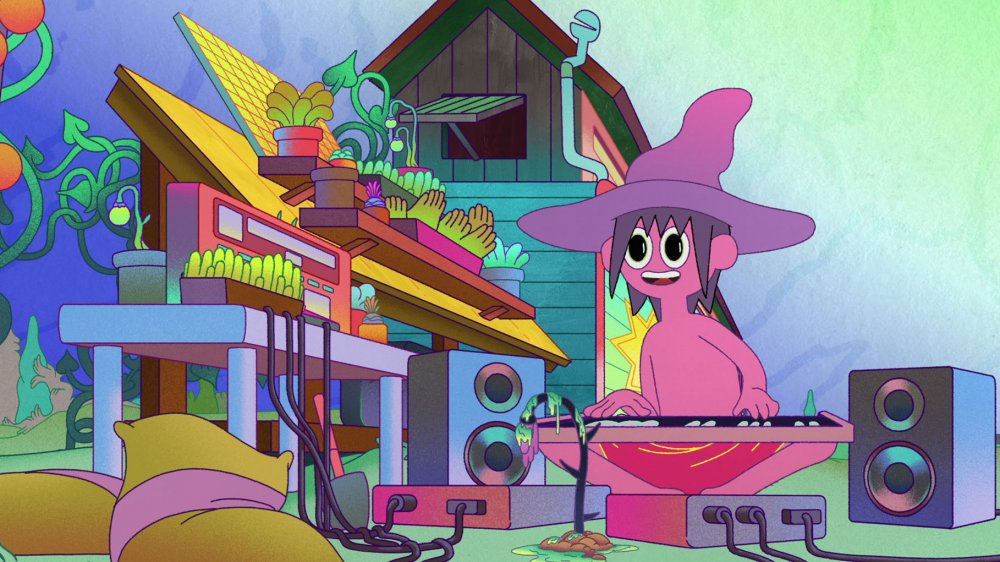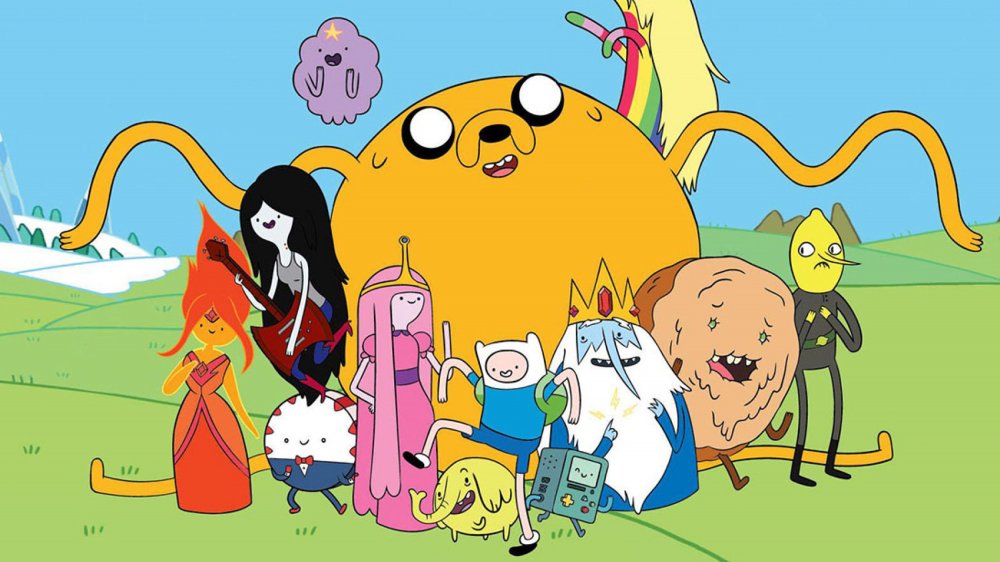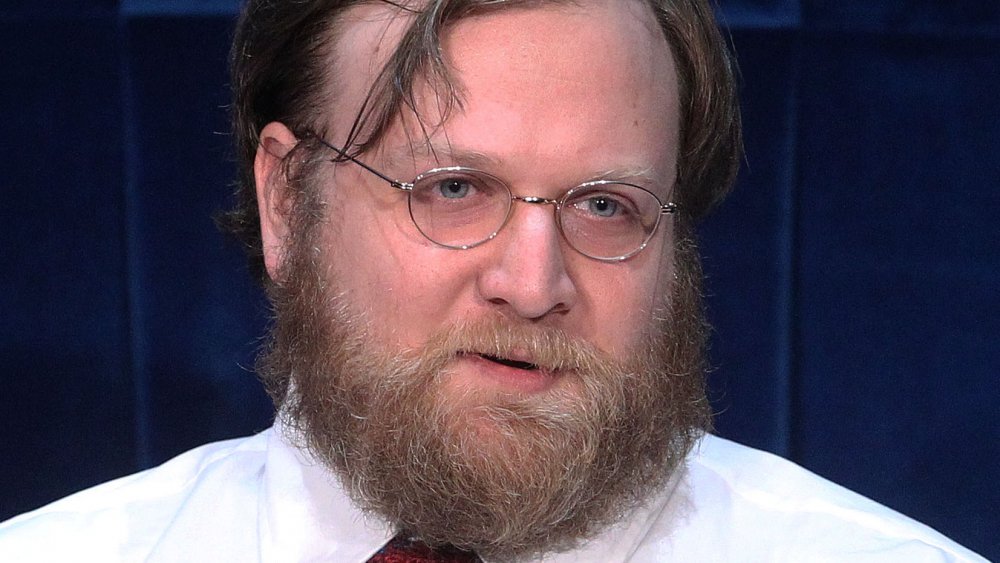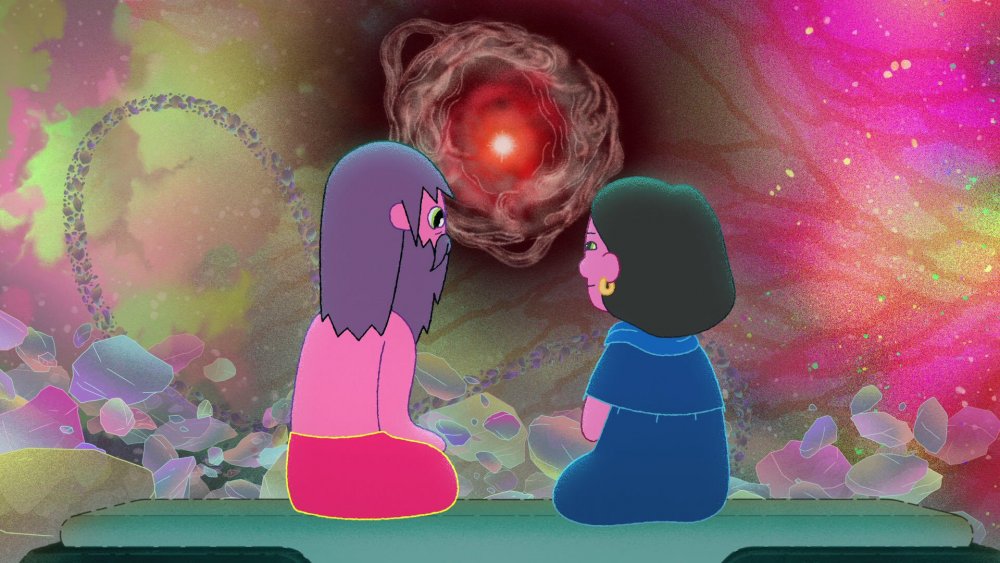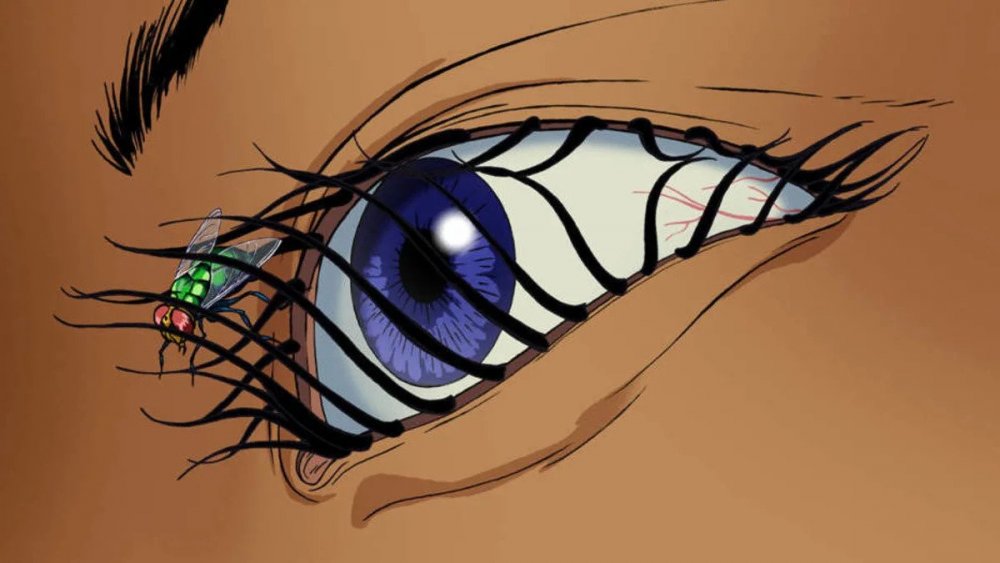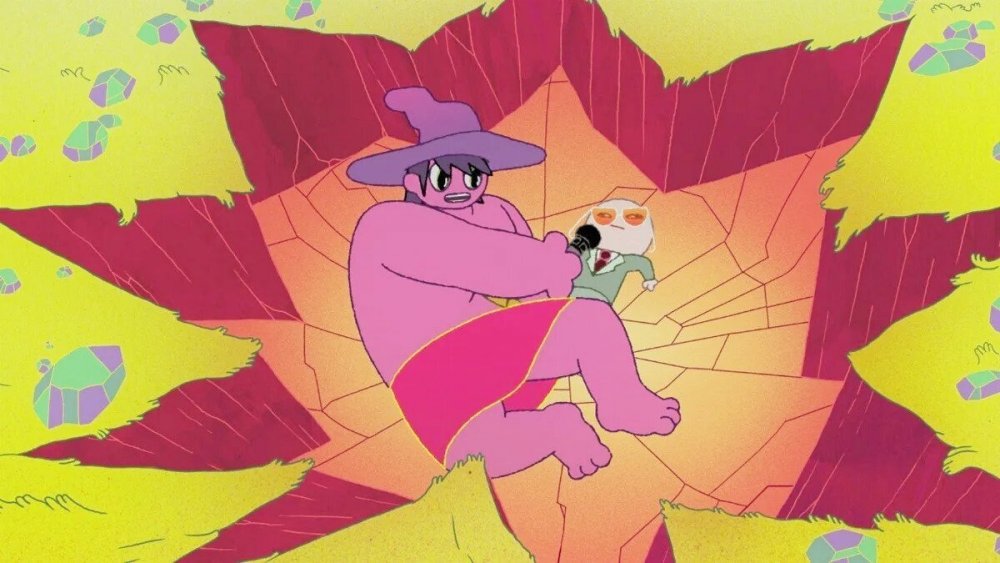The Untold Truth Of The Midnight Gospel
If you've never seen the Netflix original animated series The Midnight Gospel, then we have a couple of suggestions: first, chuck out the window any notion you have of what an animated show should look, sound, or feel like. Second, buckle up for one of the most singularly weird viewing experiences you will ever have — one in which our cheerful protagonist traverses multiple worlds, conducting genial interviews with the denizens of those worlds as they are coming to their apocalyptic ends.
Our pink-skinned hero's name is Clancy, and he is a spacecaster who lives in an alternate dimension on what is called the "Chromatic Ribbon" (stay with us here). In this dimension, incredibly powerful biological computers are used to simulate countless worlds from which new technology can be harvested, and Clancy — who is illegally in possession of one of these computers — delves into these worlds as they are ending for the purpose of gathering material for his spacecast. What's a spacecast, you ask? Why, it's pretty much like a podcast, but in space. Clancy's is called The Midnight Gospel, and he uses it to explore such weighty themes as drug use, mortality, and religion with folks whose worlds are ending in all sorts of bizarre ways.
Even though the series' visual aesthetic is... well, totally bonkers, you may notice that its style of animation is slightly familiar, and you're certain to notice that nearly all of its dialogue sounds like it might have been gleaned from actual podcasts. You're not wrong, and there are reasons for both of these points. Let's dive into the most unique new series we've seen in some time to discover the untold truth of The Midnight Gospel.
The Midnight Gospel is from the creator of Adventure Time
The Midnight Gospel is the brainchild of Pendleton Ward, whose previous creation was just a bit on the weird side as well: the Cartoon Network series Adventure Time, which ran for ten seasons between 2010 and 2018. That series took place in the magical post-apocalyptic Land of Ooo, in which a young boy named Finn and his adoptive brother Jake — a shape-shifting dog — must deal with all sorts of bizarre characters while setting right that which has been made wrong.
Although Adventure Time was technically a kids' show, it occasionally dealt with some pretty adult themes and concepts. To cite just one example, the series was set a thousand years after a nuclear apocalypse called the "Great Mushroom War." Talking about the show with USA Today in 2012, Ward said, "Dark comedies are my favorite, because I love that feeling — being happy and scared at the same time. It's my favorite way to feel — when I'm on the edge of my seat but I'm happy, that sense of conflicting emotions. And there's a lot of that in the show, I think."
There certainly was, not to mention a fair amount of decidedly adult weirdness. Rolling Stone called it "The Trippiest Show on Television" in 2014, at which point a burnt-out Ward had decided to walk away from his creation. Asked at that time if he would ever consider creating another TV series, Ward said, "No, never. That sounds like a nightmare." But unbeknownst to to almost everyone, he was already nurturing the idea that would become The Midnight Gospel, thanks to his favorite podcaster.
Duncan Trussell's podcast gave Pendleton Ward some weird ideas
In 2013, while still hard at work on Adventure Time, Ward became a fan of The Duncan Trussell Family Hour, a podcast hosted by actor and comedian Duncan Trussell, whose interviews tend toward the wide-ranging, meandering, and philosophical. Ward even shot Trussell an email expressing his appreciation, and before long, the two became friends. Speaking with IGN, Trussell remembered, "Pendleton eventually came to me with an idea of how to do an animated version of my podcast. He said: 'It's like we replace the dialogue of Indiana Jones with podcast conversations.' This was the beginning of The Midnight Gospel."
The guys had conversations about potential directions for the series, but at the time, Ward was still too busy to dedicate himself to the project. The idea simply wouldn't leave him alone, however, and a few years later he came back to Trussell with an animatic featuring a rough draft version of Clancy interviewing a guest while dealing with a zombie invasion (via Inverse). That bizarre concept would actually make it all the way into the finished series (the very first episode, in fact), and it marked the very beginning of what Trussell called "literally the most enlightening artistic collaboration I've ever had in my life."
The Midnight Gospel's story comes from the fusion of two worlds
It might not seem like the most natural thing in the world to mash up the worlds of adult animation and podcasting, and to be sure, The Midnight Gospel's entire aesthetic can be profoundly disorienting, especially at first. But the wildly creative conceit of "spacecaster" Clancy gathering material by visiting alternate universes not only allows for a wide variety of topics to be covered while navigating bizarre, impossible situations, it also allows for storytelling possibilities which wouldn't necessarily present themselves right off the bat (and which we won't spoil here).
Of course, the insane action paired with Trussell's probing, thoughtful interview style also makes for an inherently comedic clash — something Trussell credits Ward with realizing when they were developing the series. In an interview with Animation Magazine, Trussell said, "I guess even during apocalyptic situations, people aren't going to be always talking about the apocalypse and not about interpersonal relations. So, even though our hero goes through all these different scenarios, the conversation grounds it while allowing it to exist in these beautiful, ethereal and psychedelic worlds."
Trussell continued to point out that despite the often weighty themes being discussed and apocalyptic events unfolding throughout the series, The Midnight Gospel isn't meant to be a downer. "'Gospel' means good news," he said, "and I was hoping that we convey the message that even through the most catastrophic situations, when everything is falling part, there is opportunity to grow as a person."
The Midnight Gospel has some crazy influences
As you might expect, The Midnight Gospel has a wide array of influences, some of which are incredibly weird. The chief influence on the series' creation is, of course, Trussel's podcast — which is pretty wild in and of itself. We're not sure what goes on inside the mind of a guy who listens to an in-depth, insightful, often hilarious interview and extrapolates an animated series featuring spacecasters, alternate universes, and the Chromatic Ribbon; only Pendleton Ward knows that.
The style of animation, though, was influenced by all manner of bizarre media. In an interview with CBR, Trussell cited the live-action works of David Lynch as an influence, plus Adult Swim series like Aqua Teen Hunger Force and Space Ghost Coast to Coast. Toss in child-traumatizing animated features like Watership Down and The Last Unicorn, along with an MTV series which will be remembered fondly by readers of a certain age, Liquid Television.
That animated anthology series ran for three seasons between 1991 and 1995, and often served up heaping helpings of the trippiest stuff you were ever likely to see on TV. It introduced the world to Aeon Flux and Beavis and Butt-Head, proving that you'd never know exactly what craziness you were going to see when tuning in. In that respect, its influence on The Midnight Gospel is obvious.
The Midnight Gospel had a significant premiere date
The series made its debut on Netflix on April 20, 2020, a date which is going to look... highly significant to many of you. Could it be a mere coincidence that one of the most mind-blowingly weird new shows on TV just happened to premiere on the unofficial holiday for stoners all over the world? In fact, it absolutely was not. That premiere date was set intentionally, not by Trussell or Ward, but by their bosses at Netflix.
Oh, sure, it's not like The Midnight Gospel's creators are squares; in a conversation with The Daily Beast, Trussell referred to weed and psychedelic drugs as "one of the great gifts the dimension we're in has to offer people, when used responsibly." But the comedian said that it was during a meeting with Netflix executives that the idea was floated to give The Midnight Gospel a release date which would announce its aesthetic to the world. "One of [the executives] said, 'Duncan, what do you think about us putting the show out on 4/20?'" Trussell remembered. "They knew, already, that I was going to be like, 'You guys, I love you!'"
As of this writing, it's not clear whether the series will receive a second batch of episodes; again, we don't want to spoil anything here, but the first season seems pretty self-contained. We can always hope, though — and you'd better believe that as April 2021 approaches, we'll be keeping our eyes peeled for the trailer.
